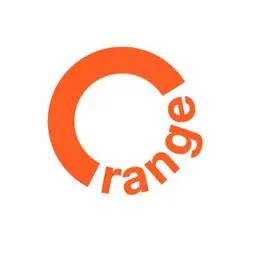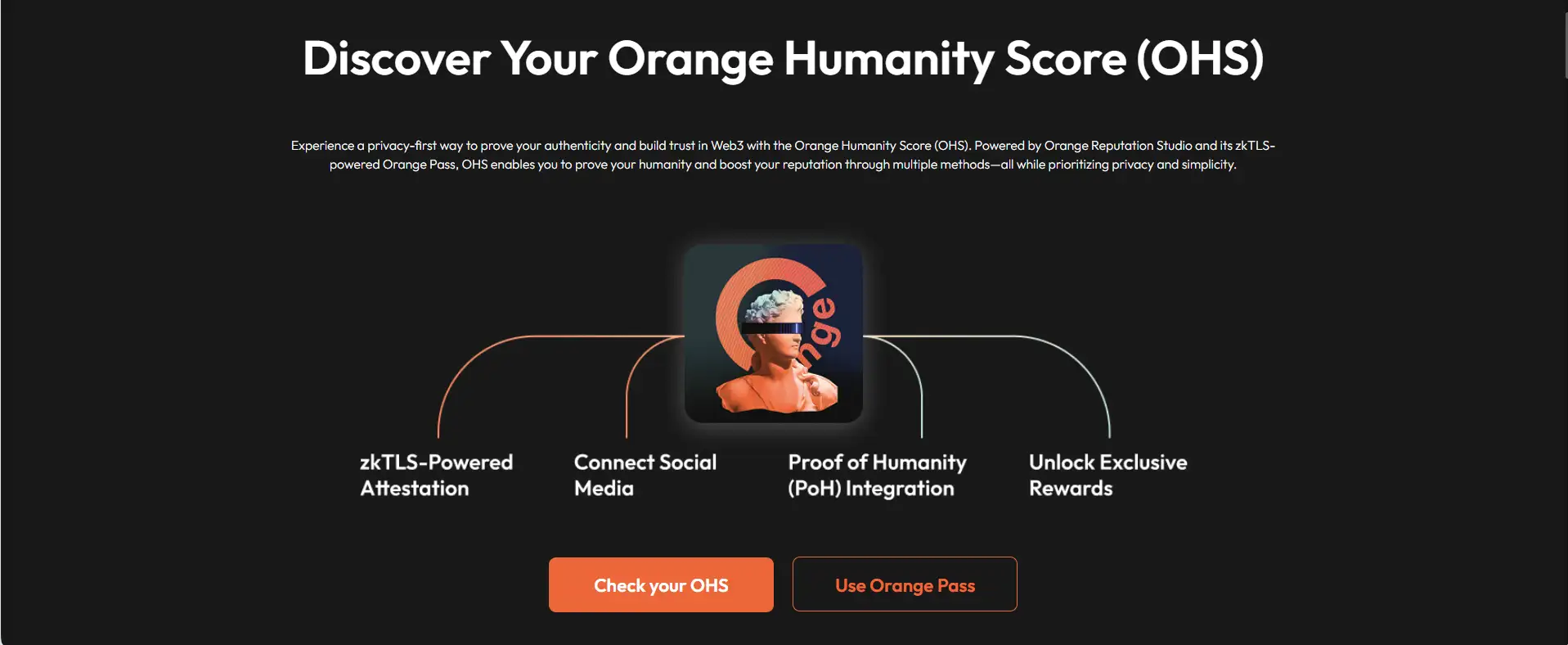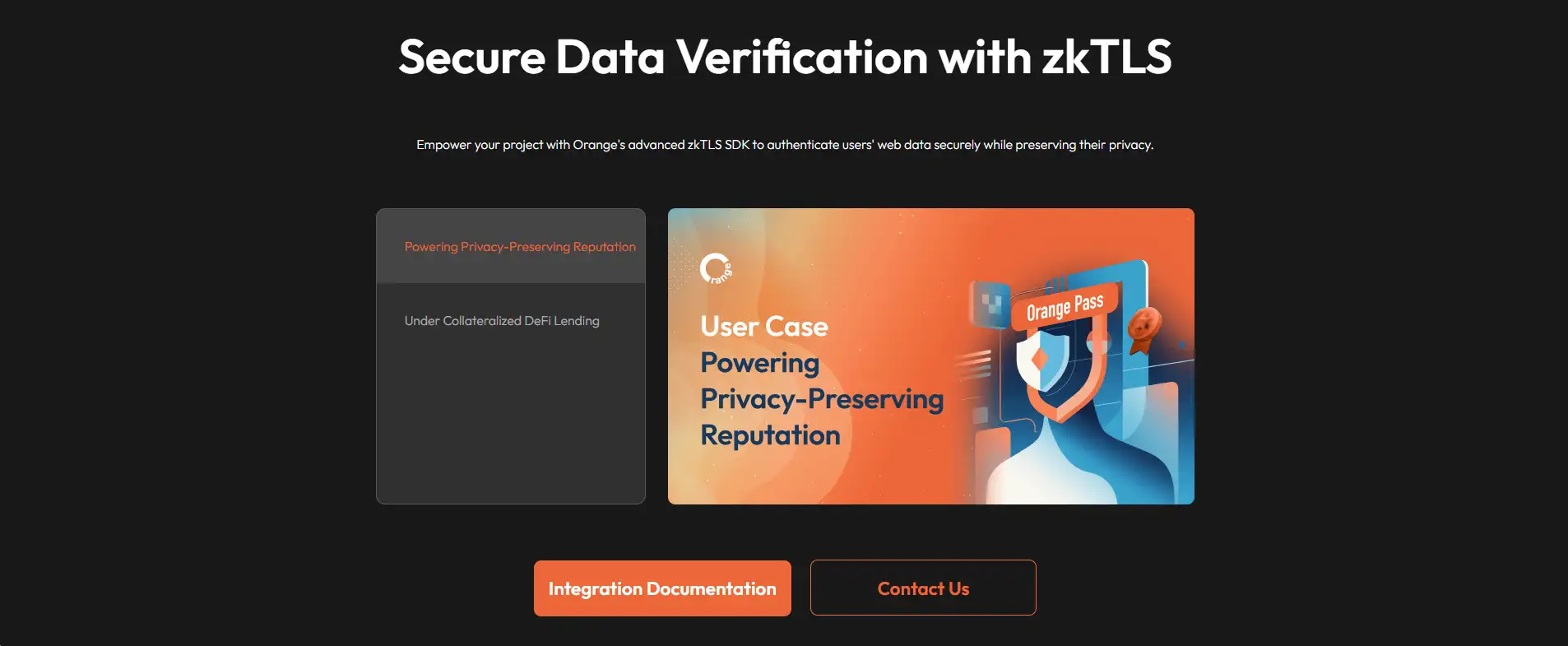About Orange Protocol
Orange Protocol is a pioneering Web3 infrastructure project focused on building trustless, decentralized reputation systems using a unique combination of zkTLS encryption, DID frameworks, and Verifiable Credentials (VCs). Designed for individuals, developers, and DAOs, Orange Protocol helps prove online authenticity while preserving privacy across decentralized ecosystems.
The project introduces the Orange Humanity Score (OHS)—a cross-platform, privacy-first identity and trust metric that quantifies users’ digital presence and interactions. Leveraging both on-chain behavior and off-chain credentials, OHS helps communities, DeFi platforms, and governance systems prevent Sybil attacks and reward real users. Whether you're an individual seeking reputation-based access, or a protocol looking to build a customized trust layer, Orange Protocol provides the infrastructure to make it happen.
Orange Protocol is redefining how reputation and identity are managed in the decentralized world. Unlike centralized solutions or basic KYC systems, Orange Protocol allows users to establish and manage self-sovereign identities by aggregating and processing a wide range of on-chain and off-chain data. This includes wallet transactions, social interactions, DAO participation, DeFi engagement, and more—all without exposing personal data to third parties.
The heart of the protocol lies in the Orange Humanity Score (OHS), which quantifies a user's authenticity and trustworthiness. The OHS combines decentralized identity (DID), social media verification, on-chain activity, and Proof of Humanity (PoH) validations from partners like BrightID and Gitcoin Passport. The score can then be minted as an OHS NFT or used in the form of a Verifiable Credential (VC) to access reputation-gated DAOs, DeFi lending, token sales, and campaign incentives.
Orange Protocol's architecture is developer-first. It includes SDKs and APIs to integrate reputation logic directly into smart contracts or dApps. This makes it easy for DAOs to replace token-based voting with reputation-based governance, or for lending platforms to issue undercollateralized loans based on trust scores. For example, lending dApps can score users by analyzing historical wallet holdings, DAO votes, social credibility, and risk profiles.
The platform also supports seamless integration with various DeFi protocols like AAVE, Uniswap, PancakeSwap, Curve, and SushiSwap, helping to bring context-aware insights to blockchain interactions. Compared to alternatives like Gitcoin Passport or BrightID, Orange offers a more holistic and programmable framework.
Ultimately, Orange Protocol is not just a data aggregator—it’s a programmable trust layer for the Web3 world. It empowers individuals to prove their value and contributions, and gives platforms the tools to reward legitimate behavior while discouraging bots, sybil attacks, and manipulation. Whether you're building a DAO, a game, or a DeFi platform, Orange provides the missing piece: verified, decentralized reputation.
Orange Protocol provides numerous benefits and features that make it a transformative tool in the Web3 reputation ecosystem:
- Trustless and Decentralized: Operates with zkTLS-based verification, ensuring data privacy and integrity without relying on centralized intermediaries.
- Self-Sovereign Identity: Users retain full control of their identity and reputation data through DIDs and VCs, granting access only when needed.
- Cross-Platform Compatibility: Works seamlessly across DeFi, DAO, NFT, and Web2 platforms, supporting both EVM and non-EVM chains.
- Dynamic Scoring via OHS: The Orange Humanity Score dynamically reflects trustworthiness based on both on-chain behavior and off-chain verifications.
- Customizable Outputs: Developers can issue reputation NFTs, VCs, or plain-text reports based on programmable logic and data inputs.
- Reputation-Based Campaigns: Participate in airdrops, token sales, DAO privileges, and user segmentation based on verified reputation.
Getting started with Orange Protocol is simple for both individuals and developers:
- Connect Your Wallet: Visit the Reputation Studio and connect your primary wallet that reflects your Web3 activity.
- Link Your Accounts: Authorize connections to social profiles like Twitter, Discord, and GitHub to improve your OHS.
- Choose a Model: Select a pre-existing reputation algorithm or configure your own using Orange's SDKs and dashboard.
- Mint Your Score: Generate your Orange Humanity Score and optionally mint it as a reputation NFT.
- Integrate via API: For developers, integrate OHS logic and data into dApps or smart contracts via Orange’s zkTLS SDK.
- Join a Campaign: Use your score to access exclusive campaigns, partner dApps, and even gain discounts in Token Generation Events (TGEs).
Orange Protocol FAQ
Orange Protocol combats bots and fake identities using its zkTLS-secured Orange Humanity Score (OHS), which verifies real human engagement through a mix of on-chain behaviors and social media profiles. This score is stored as a Verifiable Credential or NFT, allowing projects to enforce Sybil-resistance for airdrops, DAOs, and community rewards via orangeprotocol.io.
Unlike identity verifiers like BrightID or Gitcoin Passport, Orange Protocol lets developers build programmable reputation models using a wide range of on-chain and off-chain data. This includes smart contract interactions, social activity, NFTs, and financial history, producing dynamic scores, Verifiable Credentials, and non-transferable NFTs — all from orangeprotocol.io.
Yes — Orange Protocol is a developer-centric platform designed to help teams create custom reputation models by selecting preferred algorithms, data sources, and score formats like NFTs or VCs. With support for DID login and zkTLS authentication, Orange makes it easy to build trust mechanisms into any Web3 app via its SDK and APIs at orangeprotocol.io.
Absolutely. The Orange Humanity Score (OHS) is fully portable across Web3 ecosystems via Verifiable Credentials or minted NFTs. Users can present their OHS as proof of authenticity in DAOs, DeFi platforms, and token launches. Integration is seamless thanks to support for zkTLS and open DID standards. Learn more at orangeprotocol.io.
Privacy is fundamental to Orange Protocol. With zkTLS encryption, user data is verified without exposure. Every interaction is self-sovereign — you approve each data connection and can manage your OHS on-chain or off-chain. The protocol never stores raw data, and you stay in control at all times. Explore privacy tech at orangeprotocol.io.
You Might Also Like












